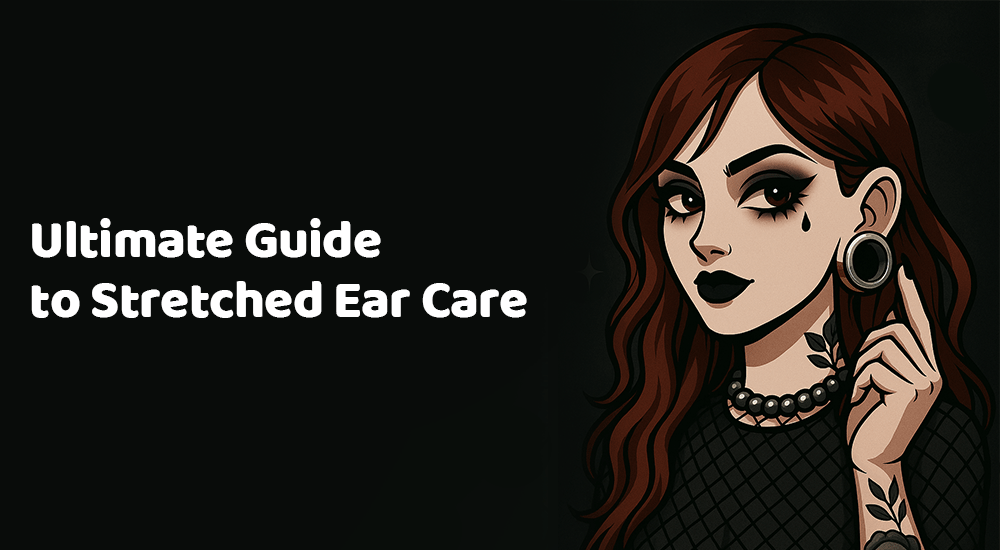Stretched ears are more than just a look – they're a lifestyle. Whether you're a seasoned stretcher or just starting your journey, proper care is essential for comfort, hygiene, and long-term lobe health. Here's your go-to guide based on best practices from the global stretching community.
Daily Cleaning Ritual

Cleanliness is crucial, especially in the early stages or right after a size up.
Use a saline solution (1/4 tsp of non-iodized sea salt in 1 cup warm distilled water)
Soak your lobes or use a cotton pad to gently wipe the area
🙅🏻♂️Avoid alcohol or hydrogen peroxide—they dry and irritate tissue
Always wash your hands before touching your jewelry
✅Recommended frequency: once daily during healing, 2-3 times/week once fully healed.
Moisturize & Massage
 Massaging your lobes keeps them soft, promotes blood flow, and reduces scar tissue. Use oils like jojoba, vitamin E, or sweet almond oil
Massaging your lobes keeps them soft, promotes blood flow, and reduces scar tissue. Use oils like jojoba, vitamin E, or sweet almond oil✅Gently massage for 5 minutes a day
Especially useful after showering🛁 when skin is warm
Benefits: Prevents thinning & Helps elasticity & Promotes healing and circulation
Jewelry Material Matters
Choosing the right material makes a big difference in healing, comfort, and longevity.
Best for Healing:
Stainless Steel: Durable, smooth, and widely tolerated.

Best for Healed Lobes:
S925 Silver: Elegant and skin-friendly, ideal once fully healed. Polish regularly to avoid tarnish.
8K Gold (Plated): A more subtle, lightweight option that provides style and comfort. Avoid during healing stages, and ensure it's high-quality plated to reduce risk of irritation 14K Gold (Plated): Offers a warmer tone and luxurious finish. Safe for healed lobes when plated with care, and perfect for statement looks.
14K Gold (Plated): Offers a warmer tone and luxurious finish. Safe for healed lobes when plated with care, and perfect for statement looks.
Avoid acrylics or low-quality plastics—they trap bacteria and can cause irritation.
Note: Always ensure your jewelry is clean and well-finished to avoid microtears.
Avoid Common Problems
Blowouts: Caused by stretching too quickly. Always wait 6-8 weeks between sizes.
Thinning: Regular massage helps; downsize if lobes look too thin.
Odor: Natural; reduce with proper cleaning and breathable jewelry.
Infection: Signs include redness, swelling, pus. Clean gently and switch to a sterile material like glass or stainless steel.
Seasonal & Lifestyle Tips
❄️Cold weather: Use oil more often to prevent dryness and cracking
☀️Hot weather: Clean more frequently to reduce sweat-related bacteria
🛌🏼Sleeping: Remove jewelry or use soft silicone plugs
🤸🏼♂️Sports & Gym: Avoid heavy tunnels or dangling jewelry during intense activity
Long-Term Maintenance
- Rotate your jewelry regularly to prevent buildup
- Downsize temporarily if you feel discomfort
- Let lobes breathe by going jewelry-free for a few hours each week
- Don’t skip massage and cleaning even after healing
When to Seek Help
If you experience:
Persistent pain ; Severe swelling or discharge ; Torn lobes or embedded jewelry
Seek professional advice from a piercer or medical provider. Early intervention prevents long-term damage.
Final Thoughts
Stretched ears are a bold and beautiful commitment. Treat your lobes with respect, stay patient with sizing, and invest in quality materials like S925 silver, tungsten steel, and high-quality gold-plated options. Your ears will thank you with years of healthy, stylish wear.

Stay stretched — stay smart.
FAQ
How long does it take to stretch your ears?
-
Stretching your ears can take months or years, with a recommended increase of one gauge size every four to six weeks. Your ears may be sensitive, but they should never be painful or stressed.
Do stretched ears hurt?
- It doesn't hurt when it's done correctly.
What does ear stretching symbolize?
- Aztecs thought that by stretching their ears, they could connect with their gods and spirits more easily.
How to tell if ears are ready to stretch?
- Be sure to wait 3-4 months (or as long as your piercing needs) for the fresh piercing to fully heal.
Can gauged ears go back to normal?
- For some people, there's a gauge size at which point their piercings will not shrink at all, and they need surgery to fix them.
Are gauges bad for your ears?
- Allergic reactions may occur if you're sensitive to metal in jewelry used during piercing and stretching, particularly with prolonged wear of tapers or plugs.




Leave a comment